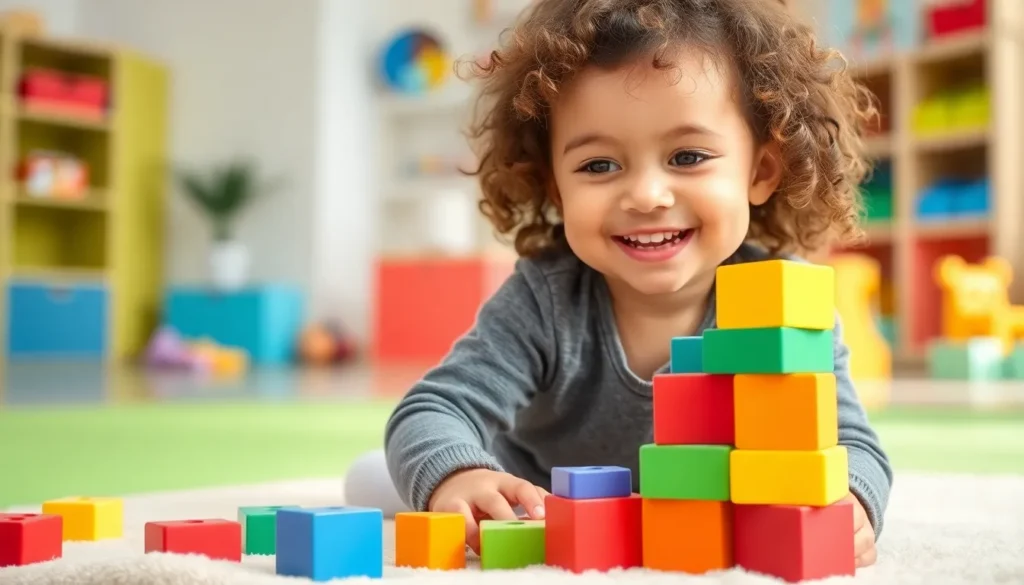When it comes to toddlers, keeping their attention can feel like trying to catch a greased pig. But fear not, because toddler games are here to save the day! These engaging activities not only entertain little ones but also nurture their creativity and development. Who knew learning could be so much fun?
Table of Contents
ToggleOverview Of Toddler Games
Toddler games encompass various activities designed to engage young children in playful learning. These games enhance physical, cognitive, and emotional development, encouraging skills like motor coordination, problem-solving, and social interaction.
Activities such as building blocks promote spatial awareness. Encouragement of creative expression occurs through finger painting and drawing, allowing toddlers to explore colors and textures. Simple board games strengthen critical thinking, while pretend play fosters imagination and storytelling abilities.
In addition, outdoor games like tag provide essential exercise, promoting health and well-being. Structured activities, such as singing and dancing, enhance rhythm and coordination, making them enjoyable for toddlers.
Interactive games that involve counting or matching support early numeracy and literacy skills. Technology-based games designed for toddlers can also offer educational content while being engaging.
The selection of games varies based on age appropriateness, ensuring both safety and developmental relevance. Playdates introduce social elements, enabling toddlers to learn sharing and cooperation. Various games provide opportunities for parents and caregivers to interact, fostering strong bonds and enriching the overall experience.
Each game encourages exploration, making learning fun and effortless. Ultimately, incorporating a range of toddler games contributes to a balanced development approach, integrating entertainment with essential life skills.
Benefits Of Playing Toddler Games

Playing toddler games offers numerous advantages for young children. These activities facilitate growth across various domains, ensuring a holistic development experience.
Cognitive Development
Cognitive skills flourish through engaging toddler games. Activities that involve problem-solving enhance critical thinking abilities. Games like puzzles or building blocks stimulate spatial awareness and improve attention spans. Memory games challenge toddlers to recall patterns and sequences, fostering memory retention. Exploring new concepts through interactive play aids in language acquisition and vocabulary growth. An enriching game environment also encourages curiosity, inspiring toddlers to ask questions and seek answers.
Social Skills
Social skills develop significantly through cooperative toddler games. Interacting with peers during playdates teaches sharing and turn-taking, vital components of healthy relationships. Simple board games encourage teamwork and communication. Engaging in pretend play allows toddlers to practice empathy by understanding others’ feelings. Group activities boost confidence, helping children express themselves in social settings. Emphasizing cooperation makes it easier for toddlers to navigate social challenges as they grow.
Types Of Toddler Games
Toddler games come in various forms, each designed to promote learning through play.
Indoor Games
Indoor games offer ample opportunities for skill development. Building blocks help cultivate motor skills and hand-eye coordination. Creative activities such as painting stimulate imagination and enhance fine motor abilities. Simple board games facilitate critical thinking and introduce strategic play. Puzzle games engage problem-solving skills while providing a sense of accomplishment for young children. Dance games not only teach rhythm but also encourage physical movement in a fun setting. These games create a vibrant learning environment within the home.
Outdoor Games
Outdoor games provide essential physical activity and social interaction. Activities like tag promote cardiovascular health and agility through structured play. Nature scavenger hunts encourage exploration and observation skills. Ride-on toys improve balance and coordination while allowing toddlers to develop confidence. Group games, such as duck-duck-goose, foster teamwork and communication. Playing with balls can enhance gross motor skills and coordination. Outdoor games create a lively atmosphere where toddlers can socialize while staying active.
Choosing The Right Toddler Games
Selecting suitable toddler games involves focusing on age appropriateness and safety. Both factors ensure a positive play experience that supports development.
Age Appropriateness
Choosing age-appropriate games enhances developmental benefits. Games designed for toddlers typically cater to their specific cognitive and physical abilities. For example, block sets support fine motor skills, while simple puzzles boost problem-solving. Age-appropriate games engage toddlers and challenge them without causing frustration. Interactive activities, like matching games or color recognition, align with early learning goals. Consider development stages when selecting games: toddlers aged 1-3 may prefer sensory-based activities, while 3-5-year-olds often enjoy imaginative play or cooperative games. Prioritizing age relevance maximizes enjoyment and fosters essential skills.
Safety Considerations
Safety considerations are vital when selecting toddler games. Inspect toys for small parts that pose choking hazards, ensuring all materials are non-toxic and durable. Checking for compliance with safety standards, like those set by the Consumer Product Safety Commission, protects toddlers during play. Selecting games with rounded edges and soft materials minimizes injury risks. Additionally, monitoring playtime in both indoor and outdoor spaces promotes a secure environment. Establishing clear rules for play encourages safe interactions among toddlers. Incorporating safety measures contributes to peace of mind while toddlers explore and learn through games.
Toddler games play a crucial role in nurturing young minds while keeping them entertained. By integrating play with learning, these activities support essential developmental milestones in a fun and engaging manner. Whether indoors or outdoors, the right games can enhance motor skills, cognitive abilities, and social interactions.
Choosing age-appropriate and safe options ensures that toddlers can explore their creativity without risk. As caregivers introduce a variety of games, they not only foster individual growth but also strengthen the bond between themselves and their children. Embracing the joy of play will lead to a well-rounded development experience for every toddler.



